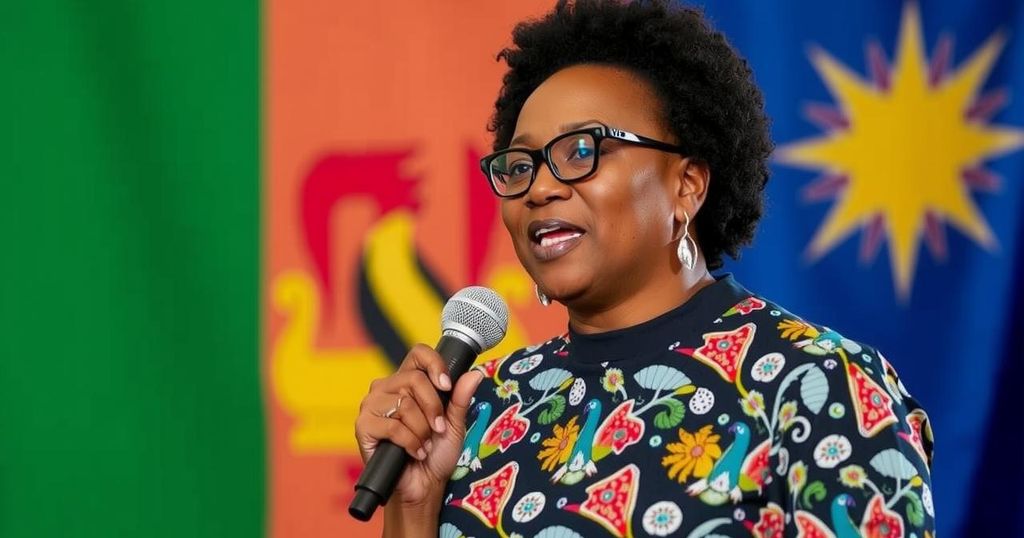Namibia Poised to Elect First Female President Amid Electoral Controversy

Namibia is on the brink of electing its first female president, Netumbo Nandi-Ndaitwah, who currently leads with 54.82 percent of the votes. However, the election is marred by disputes, with claims of irregularities from the opposition. If Nandi-Ndaitwah does not reach 50 percent, a runoff will be necessary. The overall election process, originally set for November 27, faced logistical issues that led to a voting extension, igniting further controversy.
Namibia is on the verge of potentially electing its first female president, Netumbo Nandi-Ndaitwah, who currently leads the presidential race amid a disputed electoral process. As of early Tuesday, with 65.57 percent of the votes counted, Nandi-Ndaitwah of the South West Africa People’s Organisation (SWAPO) has garnered 54.82 percent of the total votes. If she does not achieve the requisite 50 percent threshold, a runoff may be necessitated.
The election results, which were initially anticipated shortly after the November 27 polling day, have come under scrutiny following reported technical issues and shortages of ballot papers that prompted a three-day extension for voting at various locations. The main opposition party, the Independent Patriots for Change (IPC), led by Panduleni Itula, which trails with 28 percent of the vote, has already denounced the election process as illegitimate.
Voting has now been completed in 79 out of 121 constituencies, including nearly all constituencies in the capital, Windhoek. The electoral commission indicates that turnout was significant, with approximately 73 percent of nearly 1.5 million registered voters casting their ballots. Furthermore, in the National Assembly elections, SWAPO is leading with 56.38 percent of the votes counted so far, while the IPC stands at 19.23 percent.
Amid these developments, opposition figures have indicated intentions to contest the electoral results in court. They allege that various irregularities have plagued the election process and that the credibility of the election is compromised. According to Itula, “the rule of law has been grossly violated, and we cannot call these elections by any means or measure as free, fair and legitimate” – Panduleni Itula. McHenry Venaani, a leader of another opposition group, emphasized that the situation is fundamentally about the democratic principles of the nation and the equitable governance for all Namibians.
As SWAPO has ruled Namibia since the nation’s independence from apartheid South Africa in 1990, the party’s dominance faces challenges due to concerns over high youth unemployment and persistent social inequalities, which have alienated younger voters and motivated calls for change. The outcome of the current electoral dispute may have long-lasting implications for the country’s political landscape and its democratic integrity.
The forthcoming presidential election in Namibia has garnered notable attention, particularly as it may culminate in the election of the nation’s first female president. Netumbo Nandi-Ndaitwah, who serves as the vice president, has emerged as the leading candidate in an election characterized by allegations of irregularities and disputes concerning the validity of the voting process. Namibia’s political climate remains distinct as its governing party, SWAPO, has maintained power since independence, yet contemporary challenges have led to increased scrutiny of its governance, especially by younger demographics dissatisfied with social challenges.
In summary, Namibia’s presidential election is poised to herald significant change by potentially ushering in the first female president amid a backdrop of controversy and opposition claims of electoral misconduct. With Netumbo Nandi-Ndaitwah leading the count, the need for transparency and fairness in the electoral process is underscored by the concerns raised by opposition leaders. The eventual outcome will undoubtedly have profound implications for Namibia’s political future and its commitment to democratic principles.
Original Source: www.aljazeera.com







